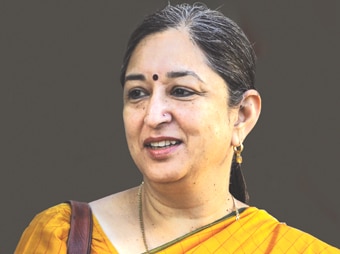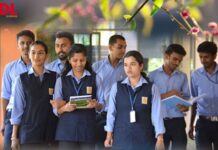
 The Welham community has grown from its original ten students to six hundred students. Jyotsna Brar, the present Principal of Welham Girls’ School, Dehradun, in conversation with Pragya Gupta, shares her insights on Modern teaching tools and development in schools of today
The Welham community has grown from its original ten students to six hundred students. Jyotsna Brar, the present Principal of Welham Girls’ School, Dehradun, in conversation with Pragya Gupta, shares her insights on Modern teaching tools and development in schools of today
|
In 1957 an ageing lady decided to acquire the small estate of an erstwhile Nawab to start a boarding school for young Indian girls. There were no funds, no staff, and no school buildings. Yet Miss Oliphant refused to give up her mission. She entrusted the task of setting up and running the school to Miss Grace Mary Linnell who became the Founder-Principal. ‘Nasreen’, the large bungalow of Nawab Saiduzzafar, was transformed into Welham, named after a Welsh village. Over the last 50 years, the school has added to its campus piece by piece and has come to symbolise independence, high standards and a progressive attitude. At the same time, from its inception, Welham has focused on developing in its students pride in Indian culture and awareness of national and global issues and concerns. |
The CCE consists of Formative Assessment (FA) and Summative Assessments (SA), which are conducted throughout the year and it has received mixed response from the teachers’ community. What is your opinion on CCE in schools?
One good effect of CCE has been that schools are compelled to look at their children a bit more holistically than merely as numbers and marks. I am a believer in formative assessment, though I do not know if I agree with summative evaluation of personal qualities and achievements. After all, each child is a work in progress. I believe that evaluation is worthwhile only if it is accurate, thought-through and sincere, and leads to change and improvement in the identified areas of weakness and strength. Here again, we cannot put the cart before the horse. First of all, all schools must be able to provide opportunities to the children to develop in all curricular and extra-curricular areas, only then is it worthwhile to assess their abilities and attainments in these areas. This means that schools must first have the teachers and the spaces to provide these opportunities for learning and growth. Certainly, a brief assessment and suggestions on how to improve can help a child to grow well. But it is both difficult and artificial to have to assign a value (a mark or a grade) to each quality and talent and effort over so many years of a child’s stay in school. Must we have the tyranny of marks and grades for everything? In our country, it is the large numbers which prove to be daunting and systems which are introduced with the best of intentions can become mere formalities, through no one’s fault. Given the huge numbers in day schools, this means that the teacher is largely reduced to doing endless clerical work.
How has training being imparted to the teachers on a continuous basis?
Our school gives great importance to teacher development. We have an annual programme for teacher development. Teacher workshops are held at the beginning of each term on different areas of education, and the school invites trainers both from India and abroad. We also encourage in-house workshops where teachers share their own learning methods with colleagues in a formal setting. The school is affiliated with the Dehradun Teachers’ Centre at the Doon School and teachers attend and conduct workshops there. Teachers also attend the subject-related workshops conducted by the Council for the Indian School Certificate to which we are affiliated. Senior staff has also conducted workshops for the Council from time to time. Teachers are encouraged to apply for schemes such as the Fulbright Teaching Exchange. They are given considerable freedom in the classroom for developing their own methods. Teachers are a completely involved and are an active component of the school’s outward-bound programmes (tours, treks and visits in India and overseas) and communityservice programmes. These offer a great learning for teachers too.
How do you see the role of Information and communication technology (ICT) in pedagogy and administration?
No one can deny the impact of ICT in education. It can be a very effective tool in pedagogy and of course, it is very useful
in administration – one hardly needsto elaborate on that. You have asked about the level of ICT implementation in our school. Well, we are all linked on a LAN, we have 24-hour fast broadband internet, we are all computer ‘savvy’, our laboratories and subject rooms are all smart classes, our daily operations are automated, we have a working ERP, students and teachers are quick and efficient with multimedia and we work off a central server on a Student Information System customised for our school.
It helps the people within a school and within the education community to be in quick touch with each other and share global resources and practices at the click of a key. However, I feel that an electronic interface must never be the medium of choice where a human interface is essential. In the lives of school-going children and their teachers and parents high-tech must not replace high-touch. It can best be an add-on to improve the quality of teaching and learning.
Teachers need to constantly upgrade themselves. ICT has made this easily possible.
As I said earlier, Teachers and Thought-leaders can share research and learning and methodologies and information very easily. Audio-Visual presentations make pedagogical transactions attractive and meaningful. However, increasingly I find that children can visually recognise much more than we could in our childhoods, but they have less and less vocabulary and expression in which to speak about what they have seen! Language skills have definitely declined. Children can make a good video, but they can’t write an essay that well.
Inspired from US and UK, the Indian HRD Ministry is planning to introduce open book examination system for class X and class XII CBSE students from next year with the objective to do away the rote learning system. Please share your view of the new emerging trend.
Open book tests all over the world are generally much tougher than regular tests. Given that the basic information is with the students, they test much higher order thinking skills than regular tests, than mere understanding and assimilationof matter. Generally many students do not fare very well in these tests. If they are administered in the correct way, then they could be introduced at the higher secondary level only.However, they have to be very well thought out and the assessment and outcomes also need to be worked out in detail. Otherwise they will be of little benefit to students. Given that there exists a wide variety of textbooks being used by students all over the country, I cannot see that these tests can be implemented very soon. If only one book is studied by all, the system will become self-limiting.
What is your vision for the school 2020?
The school will continue to upgrade itself in methodology and infrastructure in line with the requirement of the times, yet endeavour to retain its basic principles of Indian-ness, which can be expressed in these three words – Equality, Simplicity and Service.





















